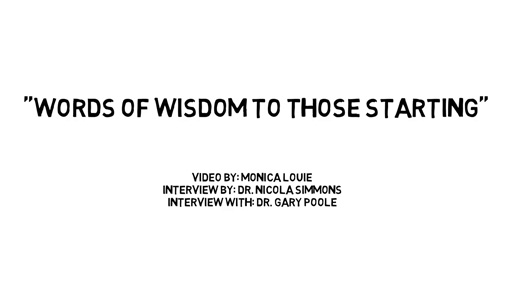1 Starting your SoTL inquiry
In this section, you will watch two videos which will help you to start thinking about the nature of a SoTL inquiry and how to get started with SoTL.
Activity 1 SoTL: Words of wisdom to those starting
As you watch this 5 minutes 7 seconds video think about the guidance Gary Poole from The University of British Columbia, Canada gives about starting in SoTL, while talking to his colleague, Nicola Simmons from Brock University. Make some notes below based on his guidance.

Transcript: Video 1 Words of wisdom to those starting
Discussion
Gary Poole shares three pieces of wisdom for starting with a SoTL inquiry: a) value your questions and believe that you have good questions; b) start small and manageable; and c) talk to other people; start a network or join a network. He acknowledges that networking doesn’t come naturally to everyone. Often people need to be taught how to discuss their research.
You may recall that, in Session 2, you considered the role of mentoring, community of SoTL practitioners and communities of practice in related areas in providing support and networking opportunities for SoTL.
In the next activity, you will revisit some of the characteristics of a SoTL inquiry that you had encountered in Session 1.
Activity 2 Big Tent Debate in SoTL
As you watch this Center for Engaged Learning video from start to 01:24, make notes on the guidance that Pat Hutchings, National Institute of Learning Outcomes Assessment and the Bay View Alliance in the US, gives about starting in SoTL.
Transcript: Video 2 Big Tent Debate in SoTL
Big Tent Debate in SoTL [Tip: hold Ctrl and click a link to open it in a new tab. (Hide tip)] video by Center for Engaged Learning, Elon University, https://creativecommons.org/ licenses/ by-nc-nd/ 4.0/
Discussion
Pat Hutchings says that the ‘Big Tent Debate’ implies that SoTL is not just conducted by a group of specialists from a particular discipline or subset of disciplines, or experts from a broad set of disciplines, but that SoTL should be in the repertoire of all educators.
Pat then outlines the stages of a SoTL inquiry: educators reflect on their work with students; raise deliberate questions and investigate those questions in systematic ways; gather evidence; and engage with others to share the outcomes of a SoTL inquiry.
Pat emphasises that educators need to be systematic about the process of sharing the outcomes of a SoTL inquiry and in engaging with others. This process of sharing helps to build knowledge, receive critique and to strengthen each other’s work. Conducting an inquiry with a view of sharing with others engenders self-discipline and helps to extract and give meanings from what has been achieved from the SoTL inquiry and from the process of sharing.
